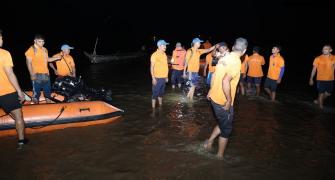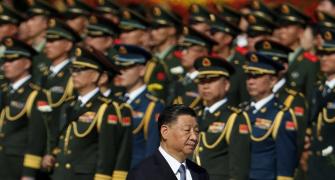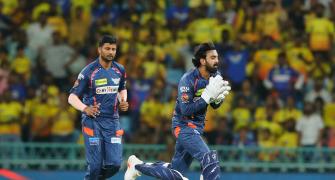The tremendous success of the Lord of the Rings trilogy, the Harry Potter movies and the Shrek series points to an increasing demand for fantasy blockbusters.
Renegade director Robert Zemeckis (Back to the Future, Forest Gump) seeks to fill this void with Beowulf, an adaptation of the English epic poem dating from the eighth century. Though the film is far from flawless, and we'll get to that shortly, Zemeckis has undoubtedly succeeded in creating an entertaining film.
Zemeckis combines the essential elements of a proper fantasy film -- heroism and mysticism, good and evil, fair ladies and knights in shining armour -- while simultaneously raising the bar in terms of what an animated film can and cannot achieve.
What's left is an interesting, disturbing, but at times disjointed interpretation of the original epic.
Also Read: Meet the cast of Beowulf
Still, Zemeckis might breathe a sigh of relief that the tale remains of anonymous authorship, as he embellishes liberally throughout, particularly in the latter half. In fact, he deliberately sets out to destroy the foundation of the original, only to put it back together piece by piece in order to reach a result most suitable for him and his medium. While this may disappoint Beowulf enthusiasts and Early British Literature students, the general viewing public may appreciate the film's funky trajectory.
The film's opening is spectacular, perfectly capturing the brutal nature of Beowulf's era. It also serves as a splendid introduction to the visual and audio extravaganza that Zemeckis has crafted: the animation is top-notch, the sound effects spot-on and the background music superb.
A Danish King, Hrothgar (Anthony Hopkins), presides over the inauguration of his newly constructed mead-hall. Intoxicated townsfolk swill alcohol, philanderers ogle woman and soldiers sing bawdy songs of conquest and pillage. The king himself happily encourages the festivities, partaking enthusiastically himself. The only person who seems miserable is the King's beautiful young bride, Queen Wealtheow (Robin Wright Penn), who is aloof and cold to her husband and subjects.
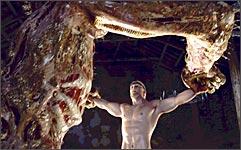 Just as the joy and merriment crescendo, a gruesome monster named Grendel (Crispin Glover) attacks the hall, killing off over half the revellers. It's not the first time Grendel has devastated the kingdom, nor does it appear to be the last. Strangely, after a direct challenge from King Hrothgar, the monster slinks back into its cave deep in a nearby mountain range.
Just as the joy and merriment crescendo, a gruesome monster named Grendel (Crispin Glover) attacks the hall, killing off over half the revellers. It's not the first time Grendel has devastated the kingdom, nor does it appear to be the last. Strangely, after a direct challenge from King Hrothgar, the monster slinks back into its cave deep in a nearby mountain range.
Beowulf (Ray Winstone), a young hero from distant lands, leads a band of his fellow Geats to Hrothgar's cursed mead-hall and pledges to kill the dreadful beast. His vainglorious accounts of past monsters slain do little to ease the worries of local townsfolk, who eye him with distrust and scepticism.
Unferth (John Malkovich), the king's advisor, approaches Beowulf in a drunken, jealous rage, predicting death for Beowulf and his men. He relates that Beowulf once lost a swimming contest in the North Sea to another hero named Breca.
And here is where Zemeckis begins his flight of fancy.
In the original, the character Beowulf is completely one dimensional and seemingly without flaw. He is the archetypal hero. In the poem, he guffaws at Unferth's accusation, denies his claim and explains that he simultaneously won the competition and saved Breca's life by fighting off sea-monsters.
In the movie, however, Beowulf says that a sea-monster
And this, in a nutshell, captures what is both good and bad about the film. The original epic may have been too linear, too simple and too one-dimensional. Zemeckis, on the other hand, introduces layer upon layer of psychology, and is particularly heavy with the Freudian and Oedipal overtones. He seeks to deconstruct Beowulf the myth and recreate Beowulf the person.
Regardless, Beowulf accepts Unferth's challenge and sleeps in the mead-hall. Sure enough, Grendel arrives and melee ensues; Beowulf triumphs in dramatic fashion.
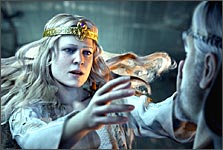 One bizarre point: Beowulf fights Grendel completely in the nude. Candle-sticks and legs of lamb strategically cover our hero's package, seemingly in tribute to the infamous scenes from Austin Powers. It's an odd touch indeed, and lends credence to the notion that the entire movie is a satire of the original epic poem.
One bizarre point: Beowulf fights Grendel completely in the nude. Candle-sticks and legs of lamb strategically cover our hero's package, seemingly in tribute to the infamous scenes from Austin Powers. It's an odd touch indeed, and lends credence to the notion that the entire movie is a satire of the original epic poem.
The mortally wounded Grendel retreats to his lair, where we first meet his mother (Angelina Jolie). Depending on which avatar she assumes, she's either a frightening dragon or a tempting, nearly-nude seductress. You can guess which one will be effective with Beowulf, who drips testosterone.
To delve too deeply into the plot runs the risk of spoiling the movie, so we'll stop here.
Above all else, Beowulf provides us a glimpse of the near limitless possibilities of animation in films. The characters scratch their scraggly beards in deep thought. Upon closer examination, the beards are matted down with grime, speckled with food and dampened with mead. Tears brim up in their eyes before realistically rolling down dirt-smeared cheeks. It's eerily realistic.
But at times, this unashamed reliance on technology comes at the expense of emotion and character interactions. In fact, Grendel the monster seems to possess more human qualities than many of the townsfolk, who often seem like zombies, devoid of soul.
They aren't as lifeless as the characters in Zemeckis' Polar Express, but they surely cannot beat actors in the flesh. Take King Hrothgar, for example. The animated version is capable of roughly one tenth the power of Anthony Hopkins, as a certain sparkle he possesses does not translate through in the film.
And finally, parents, be warned: Beowulf is not for children. The film suffers from an almost obsessive fixation on sexuality, sexual prowess and the power of lust: crude sexual innuendoes from the soldiers, characters in the buff and shocking, disturbing unions revealed in the film's latter half.
Whether this emphasis on sex was to better portray the debauched era or to work deeper towards our own sexual psychology is difficult to discern, but at times, it's stifling.
Furthermore, the monsters are grotesque and truly frightening. The battle scenes are gore-fests, with dismembered bodies, severed limbs and buckets of blood.
This may be an animated monster movie, but Shrek it ain't.
Rediff Rating: 

